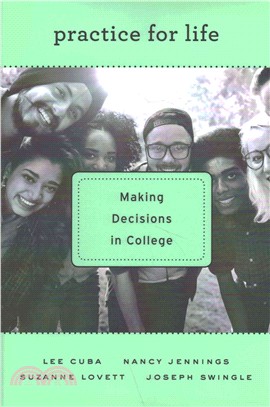Practice for life :making decisions in college /
正題名/作者 : Practice for life :/ Lee Cuba ... [et al.].
其他題名 : making decisions in college /
其他作者 : Cuba, Lee J.
出版者 : Cambridge, Mass. :Harvard University Press,c2016.
面頁冊數 : xi, 238 p. ;25 cm.
標題 : College students - Attitudes. - United States -
ISBN : 9780674970663 (hbk.)
LEADER 02258cam 2200193 a 450
001 255926
003 DLC
005 20170425153630.0
008 160303s2016 mau b 001 0 eng
010 $a 2016003823
020 $a9780674970663 (hbk.)
035 $a00302444
050 00$aLB2324$b.C83 2016
082 00$a378.1/98$223
090 $a378.198/P881///UM059994
245 00$aPractice for life :$bmaking decisions in college /$cLee Cuba ... [et al.].
260 $aCambridge, Mass. :$bHarvard University Press,$cc2016.
300 $axi, 238 p. ;$c25 cm.
504 $aIncludes bibliographical references and index.
520 $aIn this book, which is based on a five-year study following over 200 students at seven colleges, the authors argue that becoming liberally educated is a complex and messy process involving making decisions and learning from them. Colleges create spaces (both physical and metaphysical) in which students must make decisions, often in the face of ambiguous situations. Some of these decisions--like declaring a major--are formal and happen infrequently. Others--like deciding to talk to a professor after class or balancing academic and extracurricular commitments--are informal and occur almost every day. Because most of these decisions have no right or wrong answers, the choices students make, and what they learn from these choices, shape their college experiences. Students can see their decision-making as opportunities to change and reflect, a process by which they learn about themselves and acquire practice for making decisions as adults after college. But they can also see decision-making as an obstacle course for which the best approach is to minimize risk, reduce uncertainty, and finish quickly. In "figuring things out," either seeing decisions as opportunities or obstacles, college students find themselves caught up in a process of self-creation and re-creation. This simple observation about the college experience has neither been fully appreciated nor systematically explored. Yet the implications of casting student experiences as a series of choices that offer opportunities for re-creation have consequences for students and colleges alike. Students don't just start college and then finish it. They start and re-start college many times.--$cProvided by publisher
650 0$aCollege students$zUnited States$xAttitudes.$3277862
650 0$aDecision making$xPsychological aspects.$3241986
650 0$aEducation, Higher$zUnited States$xEvaluation.$3362439
650 0$aAcademic achievement$xEconomic aspects$zUnited States.$3455786
700 1 $aCuba, Lee J.$3455785
Includes bibliographical references and index.
In this book, which is based on a five-year study following over 200 students at seven colleges, the authors argue that becoming liberally educated is a complex and messy process involving making decisions and learning from them. Colleges create spaces (both physical and metaphysical) in which students must make decisions, often in the face of ambiguous situations. Some of these decisions--like declaring a major--are formal and happen infrequently. Others--like deciding to talk to a professor after class or balancing academic and extracurricular commitments--are informal and occur almost every day. Because most of these decisions have no right or wrong answers, the choices students make, and what they learn from these choices, shape their college experiences. Students can see their decision-making as opportunities to change and reflect, a process by which they learn about themselves and acquire practice for making decisions as adults after college. But they can also see decision-making as an obstacle course for which the best approach is to minimize risk, reduce uncertainty, and finish quickly. In "figuring things out," either seeing decisions as opportunities or obstacles, college students find themselves caught up in a process of self-creation and re-creation. This simple observation about the college experience has neither been fully appreciated nor systematically explored. Yet the implications of casting student experiences as a series of choices that offer opportunities for re-creation have consequences for students and colleges alike. Students don't just start college and then finish it. They start and re-start college many times.--
ISBN: 9780674970663 (hbk.)
LCCN: 2016003823Subjects--Topical Terms:
277862
College students
--Attitudes.--United States
LC Class. No.: LB2324 / .C83 2016
Dewey Class. No.: 378.1/98
- 館藏(1)
- 心得(0)
- 標籤
- 相同喜好的讀者(0)
- 相關資料(0)

